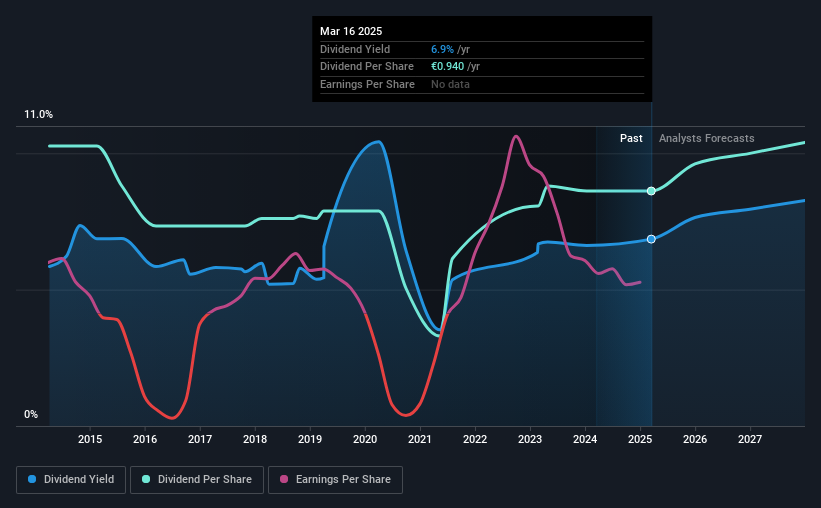The board of Eni S.p.A. (BIT:ENI) has announced that it will pay a dividend of €0.25 per share on the 26th of March. This takes the annual payment to 6.9% of the current stock price, which is about average for the industry.
View our latest analysis for Eni
Eni's Future Dividend Projections Appear Well Covered By Earnings
We like a dividend to be consistent over the long term, so checking whether it is sustainable is important. Before making this announcement, Eni's dividend was higher than its profits, but the free cash flows quite comfortably covered it. Given that the dividend is a cash outflow, we think that cash is more important than accounting measures of profit when assessing the dividend, so this is a mitigating factor.
Looking forward, earnings per share is forecast to rise by 117.0% over the next year. Under the assumption that the dividend will continue along recent trends, we think the payout ratio could be 52% which would be quite comfortable going to take the dividend forward.

Dividend Volatility
While the company has been paying a dividend for a long time, it has cut the dividend at least once in the last 10 years. The annual payment during the last 10 years was €1.12 in 2015, and the most recent fiscal year payment was €0.94. The dividend has shrunk at around 1.7% a year during that period. Declining dividends isn't generally what we look for as they can indicate that the company is running into some challenges.
Eni Might Find It Hard To Grow Its Dividend
With a relatively unstable dividend, it's even more important to evaluate if earnings per share is growing, which could point to a growing dividend in the future. Eni has impressed us by growing EPS at 84% per year over the past five years. Although earnings per share is up nicely Eni is paying out 128% of its earnings as dividends, which we feel is borderline unsustainable without extenuating circumstances.
In Summary
Overall, this is probably not a great income stock, even though the dividend is being raised at the moment. The company is generating plenty of cash, which could maintain the dividend for a while, but the track record hasn't been great. We would probably look elsewhere for an income investment.
Companies possessing a stable dividend policy will likely enjoy greater investor interest than those suffering from a more inconsistent approach. Still, investors need to consider a host of other factors, apart from dividend payments, when analysing a company. For example, we've picked out 3 warning signs for Eni that investors should know about before committing capital to this stock. If you are a dividend investor, you might also want to look at our curated list of high yield dividend stocks.
Valuation is complex, but we're here to simplify it.
Discover if Eni might be undervalued or overvalued with our detailed analysis, featuring fair value estimates, potential risks, dividends, insider trades, and its financial condition.
Access Free AnalysisHave feedback on this article? Concerned about the content? Get in touch with us directly. Alternatively, email editorial-team (at) simplywallst.com.
This article by Simply Wall St is general in nature. We provide commentary based on historical data and analyst forecasts only using an unbiased methodology and our articles are not intended to be financial advice. It does not constitute a recommendation to buy or sell any stock, and does not take account of your objectives, or your financial situation. We aim to bring you long-term focused analysis driven by fundamental data. Note that our analysis may not factor in the latest price-sensitive company announcements or qualitative material. Simply Wall St has no position in any stocks mentioned.
About BIT:ENI
Eni
Operates as an integrated energy company in Italy, Other European Union, Rest of Europe, the United States, Asia, Africa, and internationally.
Excellent balance sheet with proven track record and pays a dividend.
Similar Companies
Market Insights
Community Narratives



